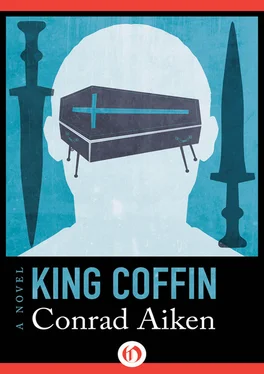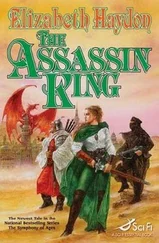“I think you are wise, and I shall mar my philosophy with no more murders. If, indeed, I have killed him; for I assure you that beyond administering the poison to his wretched body I have done nothing. Perhaps he is not dead. Can you hear his heart beating?”
“I can hear the spoons of my children beating on their empty platters!”
“Is it like that with you? Poor devil! Oh, poor, poor devil! Philosophers should have no wives, no children, no homes, and no hearts.”
— RICHARD MIDDLETON
I The Particular Occasion
In the prime assurance of his youth, in the fresh arrogance of his wisdom, and power in wisdom, with a sense of his extreme handsomeness, if not indeed beauty (for Gerta had said more than once that he was beautiful, and his own mirror had pleasantly corroborated this) Jasper Ammen leaned from the sixth floor window and projected his own image upon the world. In particular, he projected it against the sunset: a more melancholy, and therefore more pleasant, form of this occupation, and one in which he frequently indulged. The sunset lay long and level and bright-banded above the hills of Belmont and Mount Auburn. Against a streak of white light, horizontal and cold, the black tower of the cemetery marked the presence, or the absence, of Henry James; to the right of it, slowly darkening, as the evening deepened to mystery, ran the irregular line of trees toward Belmont. And as he leaned his cheek on his left hand he felt once again how all this scene, this width and depth of air and light, was becoming himself. This was all Jasper Ammen, a singular magnification or distillation of his own essence, it was himself gone abroad for the greater exercise of his subtlety and power. The tower was his strength, the trees were his strength, the evolving and changing of the light were merely, as it were, the play of his thought over an earth everywhere his own; and the clear abyss of twilit sky, the lucid profundity into which he now figured himself as looking not upward but directly and amazingly downward, was simply his own mind. Below him, across the little street, the horse chestnut tree was uncurling its first soft-russet fingers of leaf: in another three weeks, it would blossom, and this too he felt as a precise and surer emanation of himself. The gesture would be as simple as his now taking out his pipe: as his remembering the sight of the folded newspaper protruding from his letter box in the hall downstairs: or the letter from Sandbach which just perceptibly stiffened his side pocket. Sandbach, like the chestnut blossom, could wait: one could curl a handsome lip at Sandbach, one could defer or dismiss him as an inferior part of oneself, keep him at a distance, measure him from afar with an omnipotent and all-understanding eye. It was exactly like viewing and appraising one’s own past: or even despising it; for the past should always be cut ruthlessly away, allowed to fall from one, remembered not for its leaves but for its seeds.…
In this sense he despised the gradual sentimental dislimning of the spring sunset: without any sense of loss, he watched it go, gave it to the evening, allowed it to drown slowly in his own receptive darkness. He felt his face assuming its habitual expression of proud contempt, the feeling as of looking down at something very small and unimportant from a Himalayan summit. He became increasingly conscious of his high cheekbones, his narrowed green eyes, the sleepy superciliousness of his fixed gaze, the curtness of his mouth: but then he relaxed, and permitted himself to play another, and equally habitual, part, one which he often used (and to effect) in social gatherings: the part of the poet, — detached, remote, inscrutable: the Zarathustrian prophet. Ridiculous, to consider how few people knew enough of themselves to be able to use, for such social effect, their own presence, their own bodies! An elementary mistake, a fault of adolescence, if not of childhood. To know one’s moroseness, and to use it, one’s meanness and to use it, one’s hatred, and to project it vigorously and without mercy — this was, after all, only the beginning, only the beginning. One should know with scientific minuteness one’s exact appearance from every angle — the back, the sides, the look of the shoulders as they turn away, the value of one’s six-feet-two, the rhythm of one’s gait. There must be no accidents! But above all, one must value one’s capacity for hate, and use it with the finest justice. And one’s deliberate rudenesses must be carefully relished.
Bringing back his gaze from the deployed subtleties and cold venoms of the faded sunset, he turned it shortly downward toward the two flat roofs which were immediately below him. On the nearer, beyond the cement runway of the garage, a young man was sitting in a deck chair: one of The Crimson editors. His head was thrown back, his arms were lifted behind his head, a book was open on his knees. Examined, he was at once understood. A faithful and earnest joiner and belonger: a member of society. To see through him, disemboweling all his little clipped ambitions with a single penetrating eye, was as easy as it would be, from this window, to shoot him; and to consider the justice of the metaphor was only to weigh, pleasurably, one’s sense of power in a situation as superior in altitude as it was in consciousness. The young fool was comprehended, or killed, without knowing it. He had stopped reading not because it was as yet too dark, but in a twilight mood of narcissism: something had passed into him from the opened pages of that book, and he was now weakly luxuriating in that something: he was as helpless as a schoolgirl. To demonstrate this helplessness and also to prove to himself that he was not afraid of a direct action, Jasper whistled. The head turned round a little, then turned up, the eyes were surprised, the mouth was slightly opened — in short, the whole expression was foolish. The young man stared upward for a moment, but finding that his gaze was met without sign and without discomposure, turned away again, embarrassed. He was blushing. He then closed his book, rose, and walked very self-consciously to the steps which led down into the building on the far side. The dignity of his disappearance was terrific.
The flat roof beyond was a narrower and longer one, covered with tar paper and gravel; and to look at it was to observe, of course, that the cast-iron chimney pipe, at the back, had been restored to its upright position. An excellent minor example of the value of habitual observation: and it had given him pleasure to recognize in the street the woman who owned the house (merely by the way she walked) and to inform her (she not knowing him from Adam) that her chimney had fallen on the roof in the snow and might prove a source of danger. She had looked at him as if he were mad. So that was why her kitchen fire hadn’t been drawing properly! She was still saying this, from beneath her umbrella, and staring, when he bowed and walked away.…
Quarter to seven.
He took Sandbach’s letter from his pocket, the blue envelope, tapped it against his long thumb, and walked along the linoleumed corridor toward his room. He walked quickly, with a slight self-conscious scuffing of the heels, pleased with the total effect (which he had often studied in street mirrors and shop windows) of graceful casualness, and also with the echoed sound of the light iambics: his shoes were expensive. Arrived at his door, he hesitated. Sandbach might be inside, or Gerta, or both — not that it much mattered. Ostensibly, they would have come to take him to the meeting at Tremont Temple, they would chatter about that, nervously no doubt, and of course Sandbach would as usual, in that oblique sniffing way of his, be hinting about money for the sacred cause of anarchism or the strikers at Haverhill. But beneath all that would be the real sense of
Читать дальше












